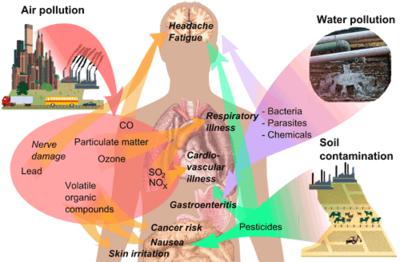A new national report shows that climate-related extreme events such as heat waves, wildfires, droughts and floods, are already affecting human health and welfare, but Oregon is among Northwest states taking major steps to reduce health risks. The recently released Fourth National Climate Assessment provides examples of actions underway in communities to reduce the risks associated with climate change.
The chapter about the Northwest emphasizes that an increase in climate-related extreme events has already resulted in health effects. These include heat- and respiratory-related emergency department visits, harmful algal blooms, and mental health risks associated both with natural disasters and with gradual changes in landscapes and livelihoods caused by climate stressors. Populations identified most at risk include children, tribes, farmworkers, and low-income households in both urban and rural areas.
A project that the Oregon Climate and Health Program led in partnership with members of the Confederated Tribes of Warm Springs is featured as a resource for understanding some of the health concerns described.
Oregon’s Public Health Division and some local health departments use a syndromic surveillance system to monitor trends in emergency department and urgent care visits when there is poor air quality or extreme heat. Syndromic surveillance and other early warning systems are highlighted as areas where action can be expanded. Certain health-related services and protections, such as providing at-risk populations with air conditioning units and air filters, are also discussed. Local health department interventions have ranged from providing water testing for domestic well users in drought-prone areas to informing decision-makers about the health benefits of proposed transportation investments.
Although public health action in Oregon is highlighted, the report acknowledges that our public health system and Oregon’s broader social safety net lack the necessary capacity to respond to projected health risks of climate change. An effort to modernize Oregon’s public health system is underway and building state and local health department capacity to respond to environmental health risks is part of this effort.
For more information visit:
• National Climate Assessment – chapter about Northwest: https://nca2018.globalchange.gov/chapter/24/.
• Climate and Health Program: http://www.healthoregon.org/climate.
# # #
Links:
Fourth National Climate Assessment: https://nca2018.globalchange.gov/
Pacific Northwest chapter of Fourth National Climate Assessment: https://nca2018.globalchange.gov/chapter/24/
Oregon Climate and Health Program: https://www.oregon.gov/oha/PH/HEALTHYENVIRONMENTS/CLIMATECHANGE/Pages/index.aspx
Climate and Health Perspectives – Voices of the Confederated Tribes of Warm Springs: https://www.oregon.gov/oha/PH/HEALTHYENVIRONMENTS/CLIMATECHANGE/Pages/perspectives.aspx
Local health department interventions: https://www.oregon.gov/oha/PH/HEALTHYENVIRONMENTS/CLIMATECHANGE/Documents/2018/OCHC-background-and-success-stories.pdf
Oregon Public Health modernization: https://www.oregon.gov/oha/ph/About/TaskForce/Pages/in









